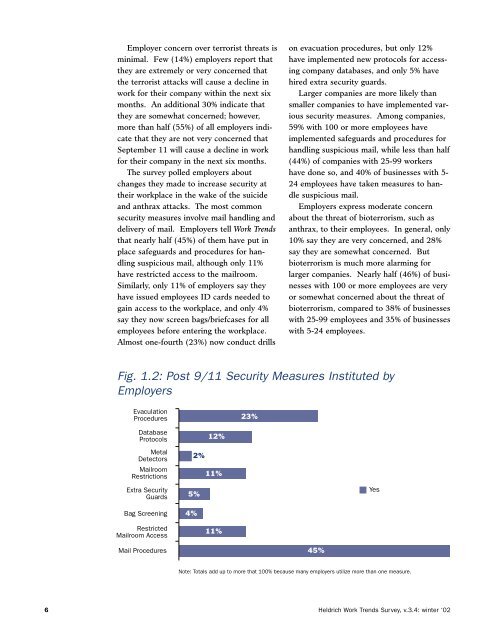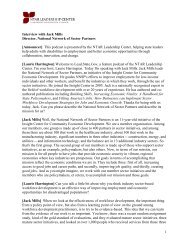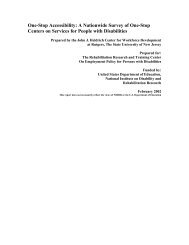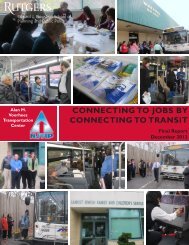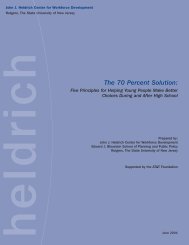Download - John J. Heldrich Center for Workforce Development ...
Download - John J. Heldrich Center for Workforce Development ...
Download - John J. Heldrich Center for Workforce Development ...
You also want an ePaper? Increase the reach of your titles
YUMPU automatically turns print PDFs into web optimized ePapers that Google loves.
Employer concern over terrorist threats is<br />
minimal. Few (14%) employers report that<br />
they are extremely or very concerned that<br />
the terrorist attacks will cause a decline in<br />
work <strong>for</strong> their company within the next six<br />
months. An additional 30% indicate that<br />
they are somewhat concerned; however,<br />
more than half (55%) of all employers indicate<br />
that they are not very concerned that<br />
September 11 will cause a decline in work<br />
<strong>for</strong> their company in the next six months.<br />
The survey polled employers about<br />
changes they made to increase security at<br />
their workplace in the wake of the suicide<br />
and anthrax attacks. The most common<br />
security measures involve mail handling and<br />
delivery of mail. Employers tell Work Trends<br />
that nearly half (45%) of them have put in<br />
place safeguards and procedures <strong>for</strong> handling<br />
suspicious mail, although only 11%<br />
have restricted access to the mailroom.<br />
Similarly, only 11% of employers say they<br />
have issued employees ID cards needed to<br />
gain access to the workplace, and only 4%<br />
say they now screen bags/briefcases <strong>for</strong> all<br />
employees be<strong>for</strong>e entering the workplace.<br />
Almost one-fourth (23%) now conduct drills<br />
on evacuation procedures, but only 12%<br />
have implemented new protocols <strong>for</strong> accessing<br />
company databases, and only 5% have<br />
hired extra security guards.<br />
Larger companies are more likely than<br />
smaller companies to have implemented various<br />
security measures. Among companies,<br />
59% with 100 or more employees have<br />
implemented safeguards and procedures <strong>for</strong><br />
handling suspicious mail, while less than half<br />
(44%) of companies with 25-99 workers<br />
have done so, and 40% of businesses with 5-<br />
24 employees have taken measures to handle<br />
suspicious mail.<br />
Employers express moderate concern<br />
about the threat of bioterrorism, such as<br />
anthrax, to their employees. In general, only<br />
10% say they are very concerned, and 28%<br />
say they are somewhat concerned. But<br />
bioterrorism is much more alarming <strong>for</strong><br />
larger companies. Nearly half (46%) of businesses<br />
with 100 or more employees are very<br />
or somewhat concerned about the threat of<br />
bioterrorism, compared to 38% of businesses<br />
with 25-99 employees and 35% of businesses<br />
with 5-24 employees.<br />
Fig. 1.2: Post 9/11 Security Measures Instituted by<br />
Employers<br />
Evaculation<br />
Procedures<br />
23%<br />
Database<br />
Protocols<br />
Metal<br />
Detectors<br />
Mailroom<br />
Restrictions<br />
Extra Security<br />
Guards<br />
Bag Screening<br />
Restricted<br />
Mailroom Access<br />
12%<br />
2%<br />
11%<br />
5%<br />
4%<br />
11%<br />
Yes<br />
Mail Procedures<br />
45%<br />
Note: Totals add up to more that 100% because many employers utilize more than one measure.<br />
6 <strong>Heldrich</strong> Work Trends Survey, v.3.4: winter ‘02


